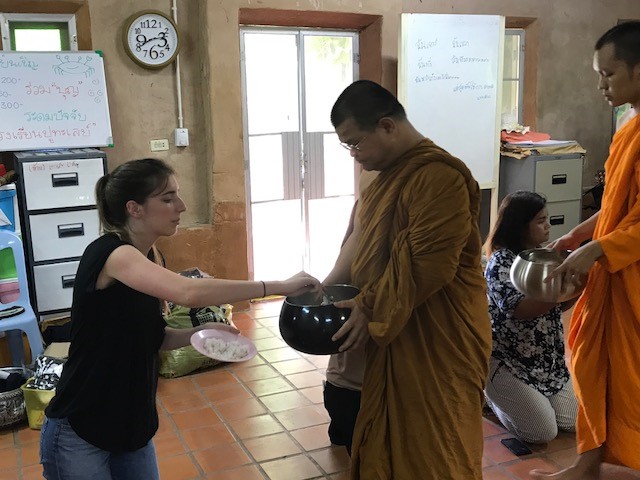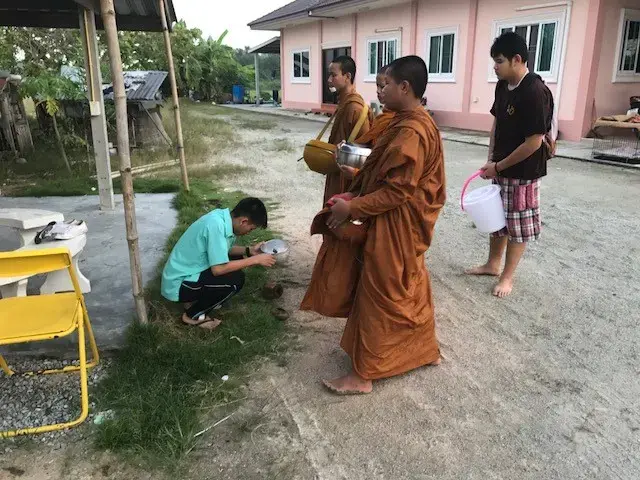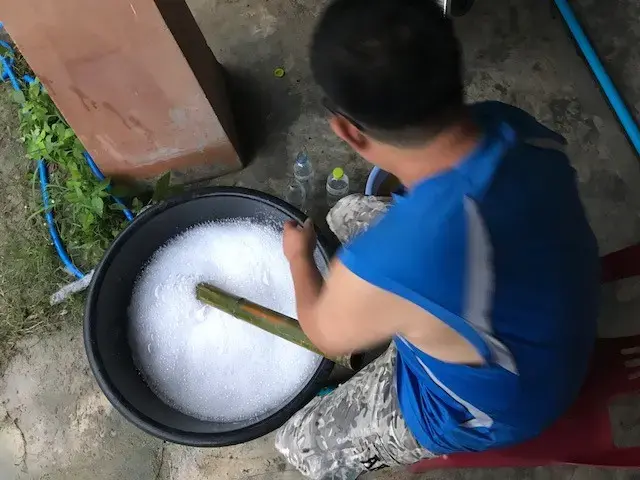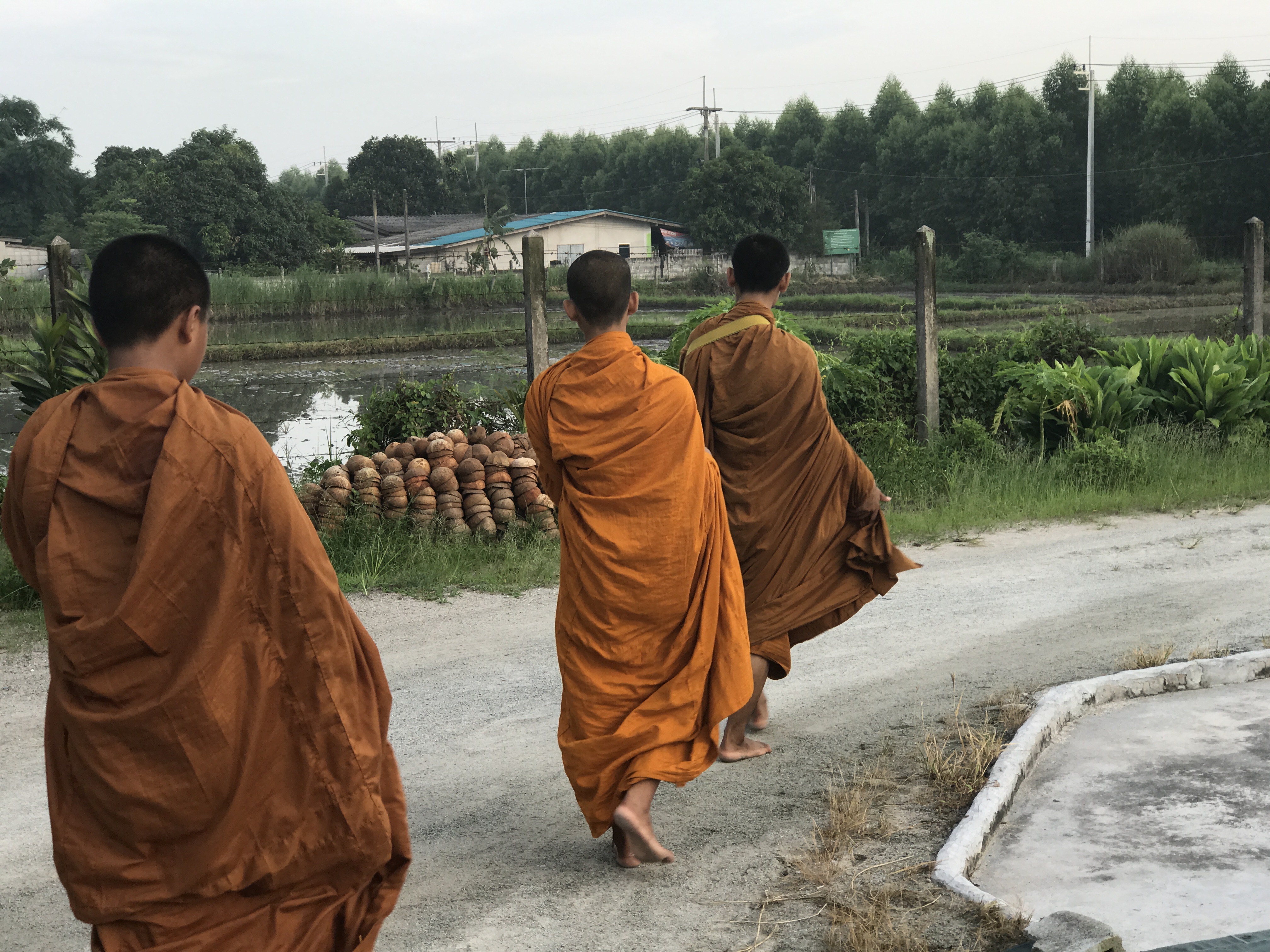
May 22, 2018
Chonburi, Thailand
A typical day at this Buddhist temple starts at 5 a.m.
I wake up and craft an outfit that covers the entirety of my legs, chest, and shoulders because women are not allowed in the presence of a monk unless their bodies are modestly covered. Following the small glow provided by my iPhone flashlight, I navigate my way to the temple, past lush green tree branches with the steady hum of buzzing insects acting as drowsy white noise.
After removing my shoes, I enter the temple to find the other residents, including young children, adults, and monks. In the morning, it is essential that every person pay the proper respects to the Buddha and his disciples. With the tile hard and cold beneath my knees, I join everyone in bowing three times to the monks seated on a platform slightly above the rest of us, then three times to the large, golden Buddha statue positioned in the corner, three more times to the photos of past Buddhist monks adorning the wall, and, finally, once more to the King.
After this morning ritual, I join four other children and three young monks-in-training, about 10 to 16 years old, on their journey around the small village in Chonburi to collect the morning alms. We stop at house after house where each villager has steamed rice, ripened jackfruit (one of the most popular fruits grown in Thailand), or fragrant soup ready to donate to the temple. After each donation, the young monks quickly bless the villagers with a prayer as they bow in devout worship.

What strikes me the most is that no matter how impoverished a villager is, with some of their dilapidated wooden homes no bigger than a tool shed found in the well-kept backyard of a typical American home, the villager always has something to donate to the temple. They have so little to give, yet they give nonetheless.
While collecting the alms, shoes are prohibited—to remind everyone how important it is to remain connected to nature. Upon returning to the temple, I am given the rare opportunity of participating in the Buddhist ritual of the giving of morning alms.
Everyone arranges in a haphazard circle as I frantically look for a person whose behavior I can mimic. One of my guides, Raj, quickly whispers the process of the ceremony and I drink in his words more fervently than the bottle of water ever-present at my side in the 95 degree heat. My worst fear is disrespecting the monks and people who have so generously opened up their lives to me. I am adamant about not making any mistakes. The ceremony begins and the six monks slowly meander around the circle with a large, silver urn and graciously accept our rice offerings. Once all the rice is collected, I am given the task of offering the rest of the food.
One of the main rules in monkhood is celibacy. Along with covering up her shoulders and legs, under no circumstances is a woman allowed to touch an ordained monk. I am not even allowed to directly offer a monk any food; instead, I have to either spoon it into their bowls or put it on a cloth for them to slowly pull towards their dishes.
Breakfast ends around 9 a.m. and the dishes are cleaned by whoever’s turn it is that week (it is the kids’ turn while I am there). Everything is either recycled, composted, or thrown into a waste-bin, which piques my curiosity about other ways the temple maintains a sustainable lifestyle.
Jim, one of the adult residents who is excited to speak English to an American, shows me how he makes organic detergent out of various juices from plants and fruits. He points out the farming stations on the temple grounds, set-up to teach students practical skills such as making biodiesel fuel and using a stationary bicycle to help produce hydropower. Phra Sangkom Thanapanyo Khunsiri, my host, a Buddhist monk, and the subject of my profile, later explains that one of his main goals in creating this school was to teach people the skills it takes to become entirely self-sufficient while accumulating “merit.” Merit can be accumulated through acts of kindness, chanting, meditation, praying, and even protecting the environment. Once people accumulate enough merit, their position in the cycle of reincarnation is promoted until they are able to reach an enlightened state and be released from the reincarnation cycle and into Nirvana.

By the time the sun has set, I am sitting elbow to elbow with the rest of the children and adults at a small, rickety table filled with food. The traditional Thai fried rice and dumplings taste precisely as good as they smell. I can almost hear the growl coming from the younger monks, who are never allowed to eat any food after 12 p.m.
After helping with the clean-up, I start off to my room, careful not to intrude on any of the nightly prayers. However, I am corralled back to the temple by Raj for evening chanting. I insist that I do not know anything in Thai, aside from how to say “hello” and “thank you,” but Raj rolls his eyes and tells me to try my best. For the next hour, I steadfastly mispronounce a string of Thai words, but my mumbled speech is drowned out by the perfect synchrony of the worshippers kneeling on thin mats. I may not understand the words being said, but I do understand their reverently bowed heads, pained kneecaps, and the feeling of unification that permeates the room in this moment.
The 15 minutes of meditative silence that follow seem to reach a new level of quiet. The frogs are still croaking and the fan in the corner is still creaking at the end of each oscillation as it has been all day, but everyone has completely retreated into their own minds.
Later, I am escorted back to my room, where I coat my skin in a thick sheen of heavy-duty bug spray, lie down on my thin sheet of a mattress, and set my alarm, once again, for 5 a.m.







